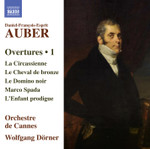|
Back
06/16/2016
“Overtures – 1”
Daniel-François-Esprit Auber: La Circassienne, S. 48 – Le Cheval de bronze, S. 25 – Le Domino noir, S. 30 – Fra Diavolo, S. 18 – La Fiancée, S. 17 – Les Diamants de la couronne, S. 34 – Marco Spada, S. 43 – L’Enfant prodigue, S. 41
Orchestre Régional de Cannes Provence Alpes Côtes d’Azur, Wolfgang Dörner (Conductor)
Recording: Théâtre Croisette de l’hôtel J.W. Marriott, Cannes, France (June 24-26, 2015) – 63’54
Naxos # 8.573553 – Liner notes in English and French

   
In today’s age, doesn’t everyone need an optimistic lift? Why not turn to music of Daniel-François-Esprit Auber and his easily approachable, non-offensive music. Back in the days, Auber was known as one of France’s most prominent opera composers, yet no significant traces of his works (France exempted) are seen today. If there’s any music that’s easy on the ear, hummable in tunes, and shimmers with optimism, look no further than this prolific Gallic composer of the early 19th century.
To give better range of Auber’s energies, this Naxos CD covers a mere one-sixth of his prodigious anthology of 48 operas (including collaborations) especially when supplemented by the splendid non-exhaustive scholarly text by Robert Letellier. Wolfgang Dörner parses Auber’s wildly flexed subject lines by stretching boundaries of pacing in broad array: while some selections are metered on a leaner, most cautious scale, others are delved into with greater energetic demeanor. Attached to Auber’s music is an undeniable spirited context which is destined to be performed with relentless perkiness and sprite remarks, yet inside Wolfgang Dörner’s interpretations, some are more vivacious than others.
The opening musical argument, La Circassienne, one Auber’s most mature works, finds Herr Dörner dishing out an aggressive and appropriately forceful tempo. It is perhaps Maestro Dörner’s best. The cleanly defined composition, enclaving a spicy-daring directive, features a beautifully brisk redowa at the midpoint. Those of the ballet persuasion will likely recognize this snippet unfolding in the marvelous BelAir Classiques’ 2014 Bolshoi production of Marco Spada, specifically the Marchesa Sampietri/Count Pepinelli pas de deux from Act I (2:16). Mr. Dörner’s take is vibrant and piquant in comparison to the more deliberate ballet extract.
On the opposing side, if any of the pieces appear to drag, it would likely be the concluding L’Enfant prodigue. It’s quite possible the religious facets and the Luke 15 parable paved way for the Cannes Orchestra to elicit an excruciatingly languid and weighty design. Auber’s musical exercise covers several melodic arguments within the five act grand opéra, but it really could use a shot of espresso.
Overture selections run the gamut, ranging from the fairy-tale (Le Cheval de bronze)[rather torpid], to more religious contexts of the ever-popular Le Domino noir [well-expressed] to well nuanced Franco proportions buried inside Auber’s beloved opera, Fra Diavolo [though not aggressive enough]. One of Herr Dörner’s freshest punctuations can be found inside Auber’s 1829 soufflé and pulsating flourishes of La Fiancée [coquettish and frivolously light].
Contrastingly, the Portuguese setting lays out the plot found inside Les Diamants de la couronne. Though the orchestra reigns with an outlined sense of sparkling display of meticulously thematic ideas, it doesn’t appear to pop enough. Marco Spada lumbers.
This Auber collective has a sense of balance, generating evenly paced parlance. The only drawback is that the extensive legato diminishes an otherwise spunky expectancy that’s heard in other recordings.
Christie Grimstad
|